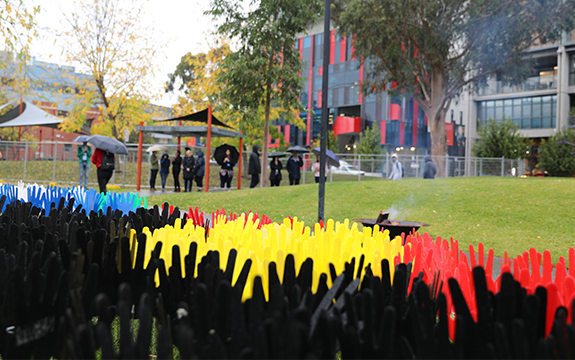National Sorry Day and Reconciliation Week explained

In Summary
- National Sorry Day is observed on 26 May to commemorate the 1997 ‘Bringing Them Home’ report
- National Reconciliation Week is bookended by two significant dates in Australian history – 27 May and 3 June
- Swinburne is committed to ensuring Indigenous heritage, knowledge and cultures are recognised by our community, and embedded into our work
National Sorry Day and National Reconciliation Week commemorate significant moments in Australian history.
Executive Director Reconciliation Strategy and Leadership, Professor Andrew Gunstone, Lecturer in Indigenous Studies, Emma Gavin, and Senior Lecturer in Indigenous Studies, Dr Andrew Peters, explain the history and meaning behind these important days.
The history of National Sorry Day
On 26 May 1997, the ‘Bringing Them Home’ report was tabled in Federal Parliament, two years after a national inquiry into the forced removal of Indigenous children was ordered.
Yanyuwa woman Ms Gavin says this day is now commemorated as a time to remember, acknowledge and pay tribute to the members of the Stolen Generations.
“This is an important day for Indigenous Australians, because it marks the first time that our stories of being stolen were heard in a formal manner.
“For non-Indigenous Australians, this was really the first time these injustices were publicised, with facts and figures and deeply personal accounts, which people all across Australia could empathise with,” she says.
“For my Indigenous family and friends, 26 May is a time for deep reflection and for remembering the past. For my family, we remember my great grandmother, who was a Stolen Child.
“We take time to reflect on what her courage meant for our family, and how we owe the lives we have now to her resilience.”
Dr Peters, who is a descendent of the Wurundjeri and Yorta Yorta people through his mother and maternal grandparents, says National Sorry Day is a solemn event for many Indigenous people and a time of reflection.
“The fact that it took so long for the Stolen Generation to become part of the national consciousness is significant. It was nearly the 21st century before 200 years of atrocities were officially recognised,” he says.
Why we mark National Reconciliation Week
National Reconciliation Week is bookended by two important dates; 27 May and 3 June. On 27 May 1967, Australians approved a referendum which enabled the Commonwealth government to legislate in Indigenous affairs and granted Indigenous Australians the right to be included in the Census.
“This was the very first time Indigenous people were counted, not just as Australians, but as humans. This was a huge step forward in the view and treatment of Indigenous people in Australia, and it gave us back, however small, a recognition of our humanity,” Ms Gavin says.
National Reconciliation Week ends on 3 June, which commemorates the historic High Court judgement in the Mabo case, recognising native title in Australia.
Ms Gavin says National Reconciliation Week is about coming together, acknowledging and remembering the past and making efforts to engage in reconciliation going forward.
“Reconciliation can have a hugely beneficial impact on improving intergenerational trauma and ensuring our future generations are not burdened with the same pain that some of us Indigenous people still hold today, as a result of colonialist policies.”
Dr Peters says while it’s important to be aware of the mistreatment of Indigenous Australians, he views National Reconciliation Week as a time to discuss what can be done to move forward.
“For me, the week is about that celebration of culture. That’s just my nature and part of my upbringing, but I’m certainly mindful that where we are today is the result of a lot of activists highlighting the negative aspects of our history,” he says.
The goal of National Reconciliation Week
“One of the really key components of reconciliation – along with recognising Indigenous rights and providing reparative justice – is acknowledging truth and addressing historical injustice,” Professor Gunstone says.
“National Reconciliation Week is about celebrating the successes, looking at the challenges still ahead and trying to educate people about what reconciliation is.”
Ms Gavin says this year’s theme asks Australians to look at colonial history truthfully and acknowledge the mistakes and injustices.
“Essentially, it is asking that the burden of these truths not be left for Indigenous Australians to carry alone. It asks that all Australians acknowledge the dark history of this country and walk into the future with open eyes and open hearts, together,” she says.
Professor Gunstone says he and his colleagues at Swinburne’s Moondani Toombadool Centre want to empower and educate people to feel confident to take steps towards reconciliation themselves.
“At Swinburne, our focus is on reconciliation during this week, but then to also remind our community that this is an ongoing issue that requires constant work. Reconciliation is everyone’s business.”

